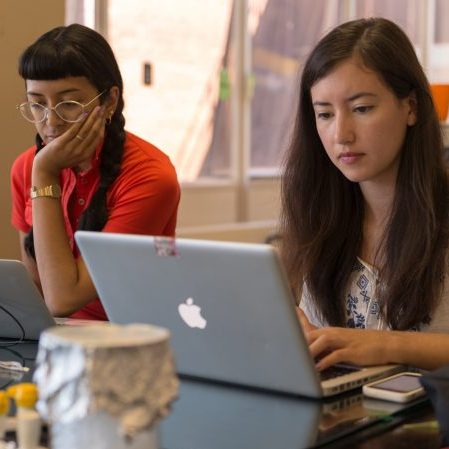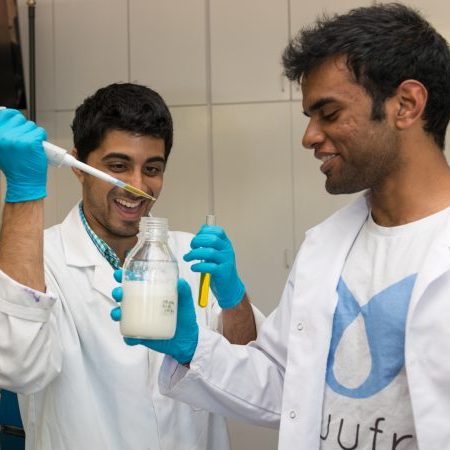- Overview
- Background
- Behind-the-scenes
Overview
For decades, humanity has produced proteins, enzymes, and small molecules via cell cultures. What if we leveraged those same industrial fermentation techniques to produce milk proteins?
That was the idea New Harvest community members Ryan Pandya and Perumal Gandhi pitched to Isha, our executive director, in 2014—entirely independently of one another.
She connected the two of them and encouraged the team to apply for funding as the New Harvest Dairy Project. That project eventually turned into Perfect Day Foods, the world’s first company to grow milk from cell cultures instead of cows.
As of November 2020, Perfect Day Foods has raised over $360 million and launched animal-free dairy ice cream in supermarkets across the United States.
New Harvest holds founding equity in Perfect Day Foods. With it, we are building an endowment for future cellular agriculture research.
Due to the explosion of private investment in cellular agriculture following the success of Perfect Day Foods, New Harvest no longer starts companies.
Behind-the-scenes
From 2014–2017, we documented updates about Perfect Day Foods here. It began with Isha Datar, our executive director and at the time, co-founder of Perfect Day (back when it was known as Muufri) blogging about the team’s first three months at an accelerator in Ireland.
Perfect Day Foods is now too big for us to keep track of what they’re up to. They are also an independent company! To stay up-to-date on Perfect Day’s latest developments, please visit their website.
- Isha with Natalie Rubio, a New Harvest intern-turned-research fellow who traveled to Ireland to help out with Perfect Day Foods (then Muufri) during their first few months in Ireland.
- Ryan and Perumal with an initial sample of milk, sporting Muufri’s old logo!
Updates
March, 2015 – In light of growing independent interest among investors in cellular agriculture, New Harvest moves away from founding companies. Instead, we focus on more neglected aspects of ecosystem building and supporting pre-competitive research.
July, 2014 – Isha Datar donates her shares in Muufri to New Harvest and gives up any formal role in the company.
May, 2014 – New Harvest volunteer Natalie Rubio interviews Perumal Gandhi about his experience co-founding the world’s first cell-cultured milk company. Read it here.
April, 2014 – New Harvest Dairy Project is accepted into the accelerator and incorporates as a company under the name “Muufri.” Ryan, Perumal, and Isha are co-founders with equal shares.
April, 2014 – Ryan Pandya, Peruma Gandhi, and Isha Datar apply to an accelerator in Cork, Ireland as the New Harvest Dairy Project.
See More Initiatives
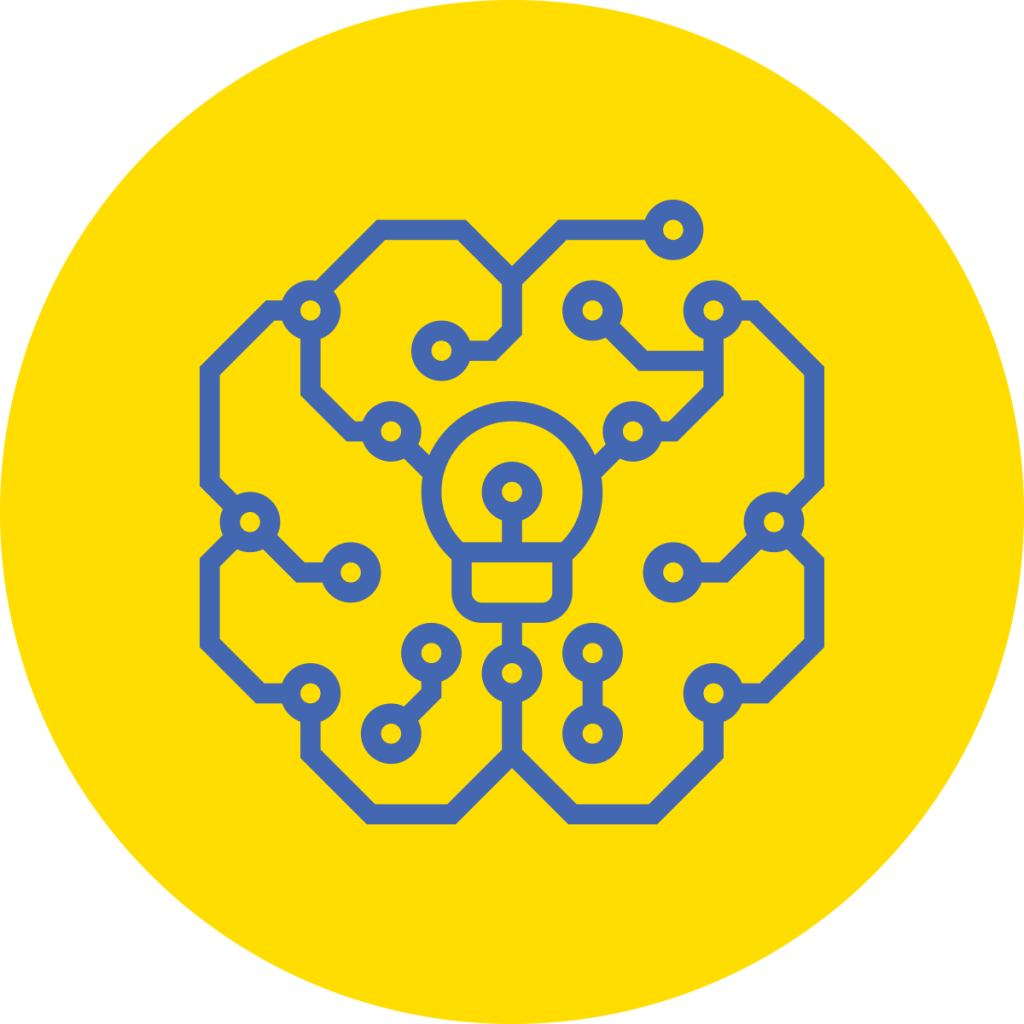
Artificial Intelligence and Machine Learning in Cellular Agriculture
Cost and scale are major blockers to cellular agriculture's success, but they are complex technical and economic challenges. Artificial intelligence (AI) and machine learning (ML) techniques could help to accelerate much of this work, but there is very little public literature on the various applications and benefits. Given the potential exponential impact of AI/ML, New Harvest and Alberta Machine Intelligence Institute (Amii) launched the AI in Cell Ag Initiative.
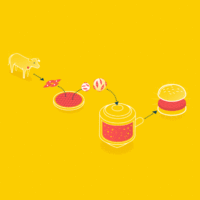
Safety Initiative Phase III: Precompetitive Collaboration on Safety Research and Methods Development
The Cultured Meat Safety Initiative (CMSI) is a joint initiative between New Harvest and Vireo Advisors aiming to address critical technical, methodological, and informational challenges related to evaluating the safety of cultured meat (CM) products.
CMSI involves the convening of diverse stakeholders, including industry, governmental scientists, regulators, academic researchers, and others. Gaining such varied perspectives advances public knowledge and the practice of food safety for CM products by identifying and addressing data gaps. Research conducted to develop data and methods build the necessary support elements for the emerging ecosystem, which can raise regulatory and consumer confidence, support industry efforts toward commercialization, and improve the efficacy of evaluation processes of regulatory safety reviews.
Building on progress from Phase I and Phase II of CMSI, New Harvest and Vireo Advisors are now working to convene diverse stakeholders to create the infrastructure for shared knowledge, methods, and data that address the priorities identified in Phase I and II. Our long-term goal is to coordinate and launch regional efforts to develop and validate analytical methods for CM safety analysis and use these methods to generate datasets that can be made publicly available to support transparent food risk assessments and policy-making processes.
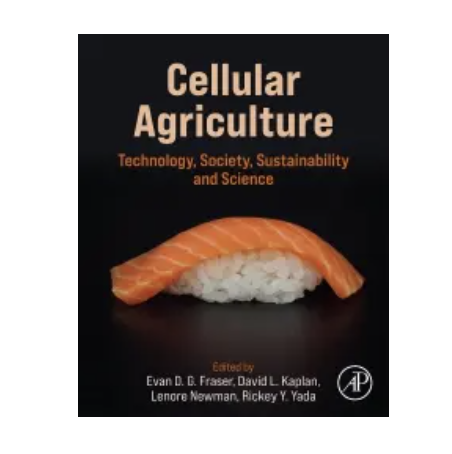
The Foundational Cellular Agriculture Textbook
Cellular Agriculture: Technology, Society, Sustainability and Science was designed to be the go-to reference for everyone in cellular agriculture - the textbook found in every company’s office, in every university lab, and in every aspiring student’s backpack.
The text provides a state-of-the-art review of cellular agriculture technologies, presenting foundational information with practical application insights. There are chapters on regulatory and policy issues, as well as reviews of the sustainability challenges of alternative proteins.
It is the first resource of its kind to take a practical approach to review the design, feasibility, and implementation of cellular agriculture techniques. With additional chapters on life cycle analyses and ideal transition scenarios, this book provides a resource for aspiring technology developers and academics alike seeking evidence-based assessments of the industry and its disruptive potential. The textbook was written by industry and academic experts for a balanced perspective of the field today and to inspire and shed light on a path forward.


